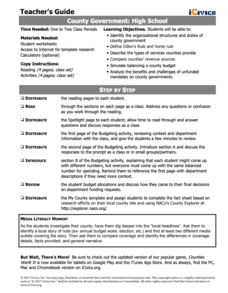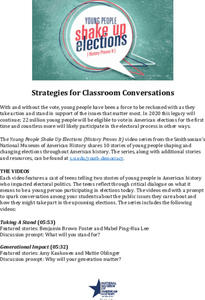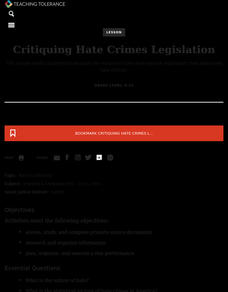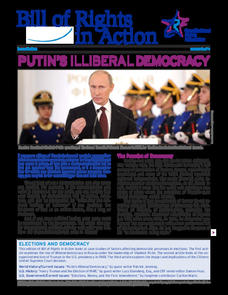iCivics
Municipal Government: High School
Municipal government takes on many roles, not just the ones we are used to hearing about such as Parks and Recreation. Scholars delve into the topic to get a grasp on how the government system functions. They participate in readings,...
iCivics
Step Nine: Action Campaign
It's time to take action! Learners strategize their action campaigns by using the resource and past brainstorming activities from the series that help them pinpoint problems in their communities. They use included templates to get the...
iCivics
Step Eight: Positions, Please!
Everyone sees the results of public policy, but not everyone understands the strategy that goes into creating an effective one. Now that your class understands the brainstorming process from earlier in the series, they continue on to the...
iCivics
Step Five: All about Public Policy
Public policy is important to understand because it affects everyone. The resource tells middle schoolers how the government uses policy to accomplish goals in the administration. It includes a reading, true or false worksheet, a...
iCivics
County Government: High School
Balancing a budget—the bane of many people's existence! Yet, its' something that must be done, especially in government systems. The resource, fourth in a seven-part series exploring local government, focuses on various exercises that...
Carolina K-12
Political Parties and Conventions
The two major parties polarize many in America today, but it doesn't have to be that way in the classroom! Teach learners about political party platforms and modern campaigns with a mock political convention. After watching a PowerPoint...
Smithsonian Institution
Young People Shake Up Elections (History Proves It) Educator Guide
Vote, it's your civic duty! The resource provides several videos about voting in the United States. Scholars watch a series of topics ranging from youth participation to civic action. The educator's guide provides teachers with...
Teaching Tolerance
Critiquing Hate Crimes Legislation
The high school activity explores what hate crimes are and how the government has responded to those crimes. Academics read legislation, analyze political cartoons, and complete hands-on-activities to understand what motivates...
Encyclopedia Britannica
Meta-Study: Political Brains
Are there differences in the brains of liberals and conservatives? That is the question young political scientists are challenged to answer. Class members examine studies, consider how the results are presented, and how the studies were...
Constitutional Rights Foundation
The Iran Nuclear Deal and Its Critics
What was the purpose of the Iranian Nuclear Deal? An insightful resource explains nuclear tensions in the Middle East and Iranian weapon development that contributed to the Nuclear Deal in 2013. Academics learn the agreement limited...
Constitutional Rights Foundation
Putin's Illiberal Democracy
Is Russia really a democracy? High school scholars explore Russian democracy under the leadership of President Putin. The resource provides opportunity for group discussion, writing, and research to understand Russia's political history,...
Constitutional Rights Foundation
Elections, Money, and the First Amendment
Those who spend the most, win. Academics read informational text, participate in group discussion, and defend campaign reforms to understand the correlation between money, the First Amendment, and election results. The resource...
Constitutional Rights Foundation
Winner-Take-All: The Two-Party System
Two's company, three's a crowd. High school historians learn about the Electoral College, a two-party, winner-take-all voting system in the United States. The lesson explains the pros and cons of the two-party system, roadblocks for...
Constitutional Rights Foundation
Why Don’t More People in the U.S. Vote?
To vote or not to vote, that is the question. Secondary scholars explore voter turnout in the United States. The resource uses informational text, group discussion, and a worksheet to help academics understand hindrances to voting...
Constitutional Rights Foundation
Suppressing the Vote
Voting rights have expanded over time, but some voters are still being suppressed. A thought-provoking resource explores the history of voter suppression in the US and efforts to remove roadblocks to voting. Young historians learn about...
Constitutional Rights Foundation
Purged From the Voter Rolls: Husted v. A. Philip Randolph Institute
Once a registered voter isn't always a registered voter. Academics explore the topic of voter registration and hindrances to remaining registered. The resource focuses on data analysis, federal voter registration law, and Supreme Court...
ProCon
Electoral College
The Electoral College's role in elections is sometimes confusing and controversial. Pupils use a debate topics website to research the pros and cons of the practice to debate whether the United States should still use the Electoral...
Judicial Learning Center
Do You Know Your Bill of Rights?
The Bill of Rights is much more than an important piece of paper! The rights cover everything from freedom of speech to the right to remain silent if arrested. Scholars find out their own rights by answering the questions in the form of...
New York State Education Department
US History and Government Examination: June 2016
A comprehension check uses multiple-choice and essay questions for a balanced examination concepts in both US History and government. The test covers a variety of topics, including British mercantilism, the Monroe Doctrine, and the...
New York State Education Department
US History and Government Examination: August 2016
Multiple-choice and essay questions test comprehension, writing ability, and skills with primary source analysis. The comprehensive exam covers many different subjects including the United States census, Constitution, and important...
University of North Carolina
Political Science
The right to vote and freedom of expression are democratic principles that fall under the study of political science. A handout describes writing assignments that are common in political science college classes and gives tips and...
New York State Education Department
US History and Government Examination: January 2018
It's time to test those skills! Assess pupils' knowledge of US history and government with short answer questions, multiple-choice items, and essays. The resource serves as a standardized test that functions well for a final exam....
New York State Education Department
US History and Government Examination: June 2017
Ready for a test that uses primary sources as a tool to assess comprehension? Learners answer multiple choice, essay, and short answer questions to demonstrate their understanding of American history.
New York State Education Department
US History and Government Examination: August 2017
Developing a test that uses primary sources to assess class members knowledge of the history of the United States is no easy task! Save yourself the time and stress and use a final exam that includes essay, multiple choice, and short...

























